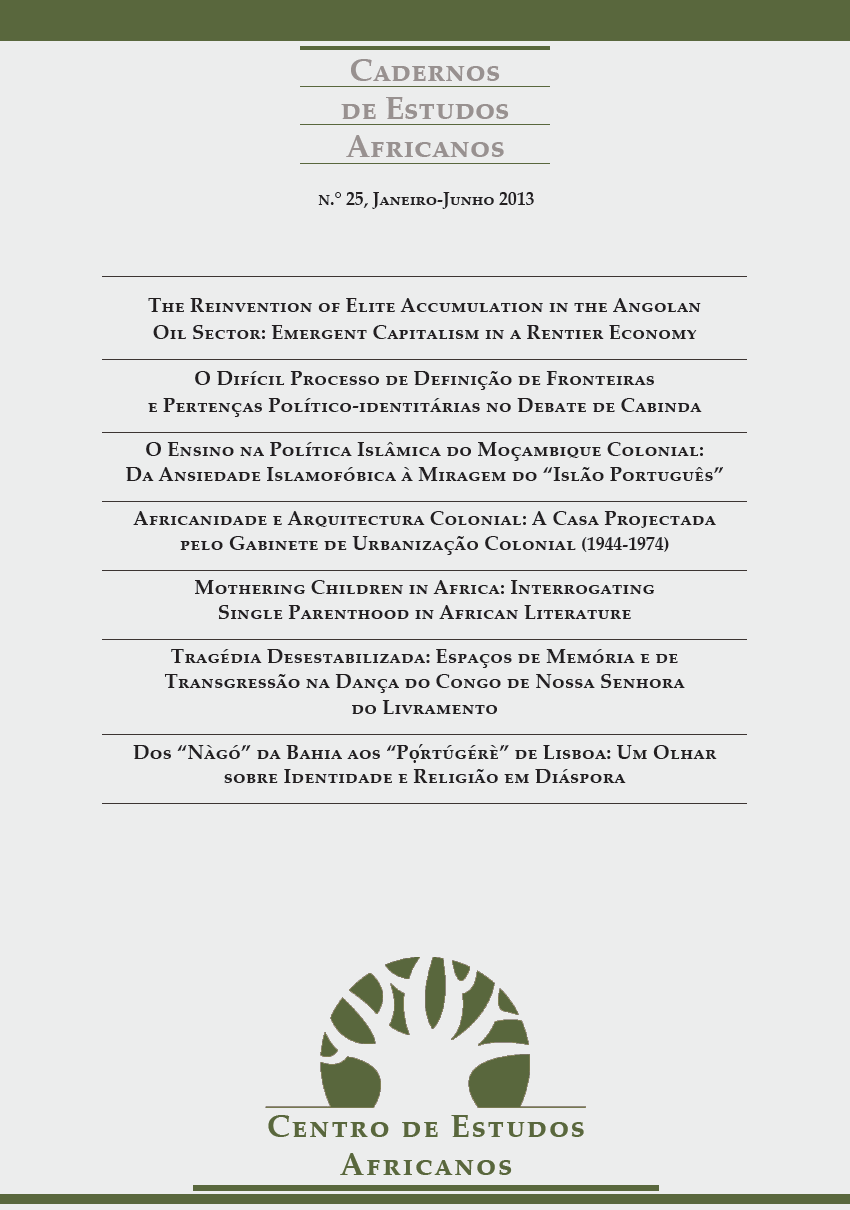The Reinvention of Elite Accumulation in the Angolan Oil Sector: Emergent capitalism in a rentier economy
DOI:
https://doi.org/10.4000/cea.839Palavras-chave:
Angola, development, petroleum, capitalist accumulation, local content, SonangolResumo
The post-war transition in Angola has involved small shifts in strategies of elite accumulation to maintain the status quo and deepen the internal concentration of power and wealth. This paper hypothesizes that Angola is at the beginning of a fundamental political-economic shift – away from the peripheral rentier economy and towards an indigenous system of capitalist accumulation. Recent developments in the oil and oil services sectors such as the push for increased local content, or “Angolanisation”, show that the elite is engaged in a process of reinventing itself. Unfortunately, the tendency of the transition is towards the further entrenchment of the power of the Angolan elite and increasingly unequal distribution of wealth under the emerging social relations of production and accumulation.Referências
Amin, S. (1974). Accumulation on a world scale: A critique of the theory of underdevelopment (Vol. 1). New York: Monthly Review Press.
Amin, S. (1976). Unequal development: An essay on the social formations of peripheral capitalism. New York: Monthly Review Press.
AngolaPress. (2011, 9 June). Private foreign investment in Angola grows, ANIP official. Agência AngolaPress. Accessed 8 July, 2011, in http://www.portalangop.co.ao/motix/en_us/noticias/economia/2011/5/23/Private-foreign-investment-Angola-grows-ANIP-official,f9cf6790-41e8-48c5-8e1d-9a3dd6f83d51.html
Boone, C. (1998). The making of a rentier class: Wealth accumulation and political control in Senegal. In Lewis, P. (Ed.), Africa: Dilemmas of development and change. Boulder: Westview Press.
DOI : 10.1080/00220389008422163
Burgis, T. (2012, 21 February). US to probe Cobalt oil links in Angola. Financial Times. Accessed 25 February, 2012, in http://www.ft.com/intl/cms/s/0/284a1c78-5cb9-11e1-ac80-00144feabdc0.html
The Economist. (2011, 6 January). Africa’s impressive growth. The Economist Online. Daily Chart. Accessed 10 May, 2011, in http://www.economist.com/blogs/dailychart/2011/01/daily_chart
Economist Intelligence Unit. (2010). Angola country report. London: EIU.
Ferreira, M. E. (1995). La reconversion économique de la nomenklatura pétrolière. Politique Africaine, 57, pp. 11-26.
Global Witness. (2002). All the presidents’ men: The devastating story of oil and banking in Angola’s privatized war. London: Global Witness. Accessed 8 July, 2009, in http://www.globalpolicy.org/images/pdfs/0302presidents.pdf
Global Witness. (2009, 4 August). Angola: Private oil firm has shareholders with same names as top government officials. Global Witness Media Briefing. Accessed 29 April, 2010, in http://www.globalwitness.org/library/private-oil-firms-shareholders-have-same-names-top-angolan-government-officials
Global Witness. (2011). Oil revenues in Angola: Much more information but not enough transparency. London: Open Society Initiative for Southern Africa-Angola and Global Witness. Accessed 18 April, 2011, in http://www.globalwitness.org/library/oil-revenues-angola-much-more-information-not-enough-transparency
Iliffe, J. (1983). The emergence of African capitalism. Minneapolis: University of Minnesota Press.
Hodges, T. (2004). Angola: Anatomy of an oil state. Bloomington: Indiana University Press.
Hodges, T. (2008). The economic foundations of the patrimonial state. In Chabal, P., & Vidal, N. (Eds.), Angola: The weight of history. New York: Columbia University Press.
Kennedy, P. T. (1988). African capitalism: The struggle for ascendency. Cambridge University Press.
Kibble, S. (2006). Can the politics of disorder become the politics of democratisation and development? Review of African Political Economy, 33 (109), 525-542.
DOI : 10.1080/03056240601001026
Klein, N. (2010). The linkage between the oil and the non-oil sectors – A panel VAR approach. IMF Working Paper. Washington, D.C.: International Monetary Fund.
Leys, C. (1994). African capitalists and development: Theoretical questions. In Berman, B., & Leys, C. (Eds.), African capitalists in African development. Boulder: Lynne Rienner.
Lopes, C. (2006). Candongueiros, kinguilas, roboteiros e zungueiros: Uma digressão pela economia informal de Luanda. Lusotopie, 13 (1), 598-642.
Marques de Morais, R. (2010). The Angolan presidency: The epicentre of corruption. Maka Angola. Accessed 7 August, 2010, in http://makaangola.org/2010/09/02/presidencia-da-republica-o-epicentro-de-corrupcao-em-angola/?lang=en
Marques de Morais, R. (2012a). Kero hypermarket: Manuel Vicente goes shopping with state money. Maka Angola. Accessed 9 February, 2012, in http://makaangola.org/2012/01/25/kero-o-supermercado-do-manuel-vicente/?lang=en
Marques de Morais, R. (2012b). Understanding President dos Santos rule and the gaming of his succession. Maka Angola. Accessed 9 February, 2012, in http://makaangola.org/2012/01/31/o-poder-e-a-sucessao-de-jose-eduardo-dos-santos/?lang=en
Metz, F. (2011). The challenging business environment – Experiences of Angolan small and medium sized enterprises. Unpublished Working Paper.
Ministério dos Petróleos. (2010). Relatório de actividades do sector petrolífero, referente ao ano de 2009. Luanda: MINPET, Gabinete de Estudos, Planeamento e Estatística.
Ovadia, J. S. (2012a). The dual nature of local content in Angola’s oil and gas industry: Development vs. elite accumulation. Journal of Contemporary African Studies, 30 (3), 395-417.
DOI : 10.1080/02589001.2012.701846
Ovadia, J. S. (2012b). The making of oil-backed indigenous capitalism in Nigeria. New Political Economy. Accessed 24 May, 2012 in http://www.tandfonline.com/doi/abs/10.1080/13563467.2012.678822
DOI : 10.1080/13563467.2012.678822
Silva, A. (2012). Manuel Vicente: Transparently corrupt. Maka Angola. Accessed 15 June, 2012, in http://makaangola.org/2012/06/01/manuel-vicente-a-transparencia-do-corrupto/?lang=en
Soares de Oliveira, R. (2007a). Business success, Angola-style: Postcolonial politics and the rise of Sonangol. Journal of Modern African Studies, 45 (4), 595-619.
Soares de Oliveira, R. (2007b). Oil and politics in the Gulf of Guinea. London: C. Hurst.
United Nations Conference on Trade and Development. (2011). Fostering industrial development in Africa in the new global environment. New York: United Nations Industrial Development Organization & UNCTAD.
Vallée, O. (2008). Du Palais aux banques: La reproduction élargie du capital indigène en Angola. Politique Africaine, 110, pp. 21-46.
Vines, A., Shaxson, N. & Rimli, L. (2005). Angola: Drivers of change: An overview. London: Chatham House.
World Bank. (2008). Doing business in 2009: Country profile for Angola. Washington, D.C.: The World Bank.
Downloads
Publicado
Edição
Secção
Licença
Direitos de Autor (c) 2016 Cadernos de Estudos Africanos

Este trabalho encontra-se publicado com a Licença Internacional Creative Commons Atribuição-NãoComercial-CompartilhaIgual 4.0.
Autorizo a publicação do artigo/recensão submetido do qual sou autor.
Declaro ainda que o presente artigo é original, que não foi objecto de qualquer tipo de publicação, e cedo em exclusivo os direitos de publicação à revista Cadernos de Estudos Africanos. A reprodução do artigo, no todo ou em parte, noutras publicações ou noutros suportes depende de autorização prévia da editora Centro de Estudos Internacionais do Iscte - Instituto Universitário de Lisboa.

